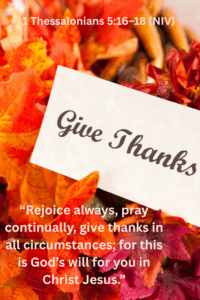Being Grateful: How to Stop Complaining and Trust God

“Stop complaining.” Those words echoed in my heart one morning when I realized how easily grumbling had slipped into my thoughts and words. I know some of you who read this blog regularly probably think that everything goes easily for me, but I can only write about the things that I have endured and gained victory over. Just recently, I found myself in a place of complaining. I was frustrated with my circumstances and the people involved. I caught myself saying they just didn’t understand what they were doing.
If I’m being honest, my complaining had little to do with the actual circumstances—it had everything to do with my heart. Matthew 12:34 (NIV) says, “…For the mouth speaks what the heart is full of.”
I realized I needed to stop complaining, but I also needed to understand where the complaining was coming from. I was under quite a bit of stress, and in that pressure, discontentment crept into my heart. From that discontentment came words of complaint. I’ve since repented and thrown off that discontentment, asking God to fill my heart with gratitude and trust once again.
Philippians 2:14 reminds us clearly: “Do everything without grumbling or arguing.”

Stop Complaining and Trust God’s Plan
In Numbers 20, Moses and Aaron experienced something similar. They and the Israelites were facing a stressful situation—there was no water. The people began to grumble, and instead of turning to God with grateful hearts, they complained.
At first, Moses and Aaron responded the right way. They went to God for direction, and God gave them a clear plan: “Speak to that rock before their eyes and it will pour out its water. You will bring water out of the rock for the community so they and their livestock can drink.” (Numbers 20:8, NIV).
But Moses and Aaron didn’t follow God’s instructions completely. Instead of speaking to the rock, Moses struck it twice with his staff and said to the people, “Listen, you rebels, must we bring you water out of this rock?” (v. 11).
God called them out for their disobedience and lack of trust, and as a result, they were not allowed to enter the Promised Land.
The story is a sobering reminder that when we complain, we often step out of alignment with God’s plan. Complaining focuses on what we think is wrong, while trusting focuses on Who’s in control.
Stop Complaining and Start Being Grateful
One of the best ways to stop complaining is to pay attention to your words and realizing that the opposite of complaining is gratitude.
Ephesians 4:29–30 (NIV) teaches, “Do not let any unwholesome talk come out of your mouths, but only what is helpful for building others up according to their needs, that it may benefit those who listen. And do not grieve the Holy Spirit of God, with whom you were sealed for the day of redemption.”
Our words matter to God. Every time we choose to be thankful instead of critical, we honor Him and strengthen our own faith. Gratitude shifts our focus from what’s lacking to what’s already been given.
Here are a few ways to start cultivating gratitude in your daily life:
- Start a gratitude list. Each day, write down three things you’re thankful for. They don’t have to be big—sometimes the smallest blessings speak the loudest.
- Replace complaints with praise. When you’re tempted to grumble, pause and say, “Lord, thank You for being with me in this situation.”
- Pray with thanksgiving. Philippians 4:6 (NIV) says, “Do not be anxious about anything, but in every situation, by prayer and petition, with thanksgiving, present your requests to God.” Gratitude in prayer builds faith in God’s goodness.
I encourage you to find someone to walk this season of gratitude with you. Share in a group or start a text messaging thread offering daily gratitude Scriptures and moments, while praising God together.
What Does It Mean to Trust God in Everyday Life?

Trusting God isn’t just for the big moments—it’s for the daily ones that wear us thin. When everyday life leaves us stressed, overwhelmed, or uncertain, trusting God means remembering that He is working even when we can’t see it.
1 Thessalonians 5:16–18 (NIV) says, “Rejoice always, pray continually, give thanks in all circumstances; for this is God’s will for you in Christ Jesus.”
And Romans 8:28 (NIV) reminds us, “And we know that in all things God works for the good of those who love him, who have been called according to his purpose.”
Trusting God in everyday life looks like taking a deep breath when things don’t go as planned, whispering a prayer when you feel overwhelmed, and choosing gratitude even when your heart feels weary.
How Can Learning to Trust God Change My Attitude and Outlook?
When we learn to trust God, our outlook begins to shift. The more we trust, the less room there is for complaining or fear. Trust transforms our attitude from frustration to faith, from negativity to praise.
2 Corinthians 13:14 (NIV) says, “May the grace of the Lord Jesus Christ, and the love of God, and the fellowship of the Holy Spirit be with you all.”
As we walk closely with God and rely on His grace, love, and Spirit, our hearts are softened. We begin to see our circumstances through His lens rather than our own. Complaints turn into prayers, and discontentment turns into peace.
What’s the Connection Between Gratitude, Joy, and Learning to Trust God?
Gratitude and joy are deeply intertwined with trust. When we trust that God is good and that His plan is perfect, joy naturally follows. Gratitude is the expression of that joy—it’s how our hearts respond to His faithfulness.
Colossians 3:16 (NIV) encourages us, “Let the message of Christ dwell among you richly as you teach and admonish one another with all wisdom through psalms, hymns, and songs from the Spirit, singing to God with gratitude in your hearts.”
When the message of Christ dwells richly within us, gratitude overflows. Joy grows. Complaining fades. And trust deepens.
So today, let’s stop complaining. Let’s start trusting. Let’s fill our hearts—and our mouths—with gratitude for all God has done and all He continues to do.
Follow us on Pinterest for more faith inspiration and Bible study.
Start a 30-Day Faith Journey to grow closer to God daily.
